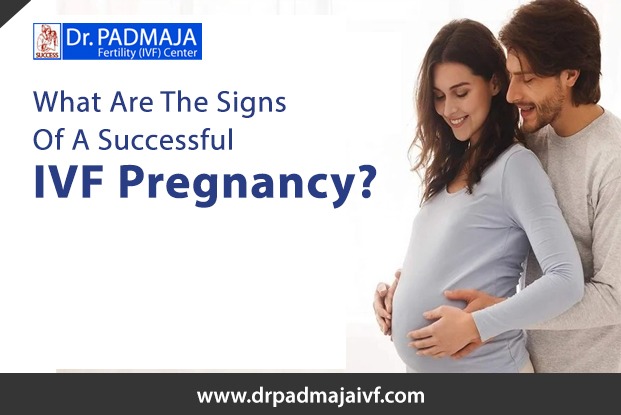In-vitro fertilization (IVF) offers hope for many couples who struggle with infertility, providing a pathway to parenthood. The waiting period after the embryo transfer is over may seem endless. During this time, many women wonder how to tell if their IVF pregnancy is successful. Understanding the early signs of a successful IVF pregnancy can help you manage this uncertain and emotional phase. If you’re undergoing IVF treatment at a reputable clinic like Dr. Padmaja IVF Center in Hyderabad, these signs can guide you through your early pregnancy journey.
1. A Positive Pregnancy Test (HCG Levels)
A positive pregnancy test is the first obvious indication of a successful IVF pregnancy. A blood test for the presence of human chorionic gonadotropin (hCG) will be conducted by your fertility clinic approximately 10–14 days following the embryo transfer. This hormone is produced after the embryo implants in the uterus, signaling that pregnancy has occurred. A positive result is an exciting moment, but it’s just the beginning of confirming the pregnancy’s viability.
2. Rising HCG Levels
Once the pregnancy test is positive, the next crucial step is monitoring the rise in hCG levels. In a healthy pregnancy, hCG levels should double every 48-72 hours during the early weeks. Your fertility doctor at Drpadmaja Fertility Center will conduct regular blood tests to ensure your hCG levels are progressing as they should. Steady growth in hCG levels is a strong indication that the pregnancy is progressing well, and your body is responding positively to the implantation of the embryo.
3. Absence of Menstrual Bleeding
For many women, the absence of menstrual bleeding after an IVF procedure is a reassuring sign of pregnancy. If you have missed your period and are not experiencing any heavy bleeding, this could mean the embryo has successfully implanted. However, light spotting may occur, which is often normal in early pregnancy. If you experience heavy bleeding or severe cramping, it’s important to reach out to your fertility doctor at a top IVF center like Dr. Padmaja IVF Center for advice and further evaluation.
4. Mild Cramps and Abdominal Twinges
Mild cramping or twinges in the lower abdomen is another common sign during early pregnancy, whether conceived naturally or through IVF. These sensations typically occur as the embryo implants itself into the uterine lining, causing some discomfort. While mild cramps can be a positive sign, severe or persistent pain should be addressed with your fertility specialist immediately.
5. Morning Sickness and Fatigue
Morning sickness, which includes nausea and vomiting, is one of the most common early pregnancy symptoms. Although it can happen at any time of day, it’s usually associated with the rapid increase in hCG levels. If you start experiencing morning sickness a week or two after your IVF procedure, it’s generally a good sign that your pregnancy is progressing. Similarly, fatigue is another common symptom during early pregnancy, caused by hormonal changes in your body. Both of these signs, although uncomfortable, typically indicate that your body is adjusting to the pregnancy.
6. Tender or Swollen Breasts
In the first few weeks of pregnancy, many women experience tender, swollen, or sore breasts. This is due to the increase in pregnancy hormones, particularly estrogen and progesterone, which prepare your body for breastfeeding. Even though breast pain is a common pregnant symptom, some people might not feel it. It’s important to remember that the presence or absence of breast soreness does not necessarily indicate the success of the pregnancy.
7. Heightened Sensitivity to Smells and Tastes
Another early sign of pregnancy is a heightened sensitivity to smells or tastes. Pregnancy hormones can make certain smells overwhelming or unpleasant, and you may also find yourself craving specific foods or unable to tolerate others. This change in sensory perception is a normal sign that your body is adjusting to the pregnancy, although not every woman will experience it.
8. Ultrasound Confirmation
The most definitive confirmation of a successful IVF pregnancy comes through an ultrasound. Typically, around 5-6 weeks after the embryo transfer, your fertility doctor will schedule an ultrasound to check for a heartbeat and assess the development of the embryo. The appearance of a fetal heartbeat is one of the most reassuring signs that your pregnancy is progressing successfully. If you are undergoing IVF treatment at Drpadmaja Fertility Center, the clinic’s state-of-the-art equipment will ensure accurate and early detection of the heartbeat and fetal development.
Why Choose the Best IVF Center in Hyderabad?
The road to a successful IVF pregnancy begins with selecting the right fertility clinic. When choosing a clinic, it’s important to consider the expertise, experience, and success rates of the doctors and their staff. Opting for a clinic like Dr. Padmaja IVF Center, one of the best IVF centers in Hyderabad, ensures that you have access to world-class fertility treatments, advanced technology, and personalized care.
Renowned fertility expert Dr. Padmaja, who has years of experience, guides her staff with kindness and commitment. At Drpadmaja Fertility Center, patients benefit from a comprehensive approach to fertility, where each IVF treatment plan is tailored to meet the unique needs of the individual. From diagnosis to post-treatment care, the center provides support at every stage, making sure you feel confident and cared for throughout the process.
Conclusion
Understanding the early signs of a successful IVF pregnancy can help reduce anxiety and provide you with the reassurance you need. From a positive pregnancy test to rising hCG levels, mild cramping, and the presence of pregnancy symptoms like morning sickness and breast tenderness, these indicators can suggest that the pregnancy is progressing well. However, the ultimate confirmation comes through an ultrasound and regular monitoring by your fertility doctor. Choosing a reputed IVF clinic like Dr. Padmaja IVF Center in Hyderabad offers the expertise, support, and technology needed to maximize your chances of a successful pregnancy. With the right care and attention, your IVF journey can lead to the dream of parenthood becoming a reality.
About The Author :

If Dr. Padmaja Divakar is a public figure or a professional in a specific field, I recommend checking her official website, professional profiles, or reliable online sources for the most up-to-date and accurate information about her background, qualifications, and achievements.
Frequently Asked Questions (faqs)
1.When Should I Take a Pregnancy Test After IVF?
You should take the test 10–14 days after embryo transfer. Testing too early may lead to inaccurate results due to residual hCG from fertility medications.
2.What Do Rising hCG Levels Mean?
Rising hCG levels indicate the development of a viable pregnancy. Your doctor will track these levels through blood tests to confirm progression.
3.Is Cramping Normal After Embryo Transfer?
Mild cramping is common and can be a sign of implantation. However, severe or persistent pain should be reported to your fertility specialist.
4.Can Spotting Mean the IVF Failed?
Not necessarily. Spotting can occur during implantation. Only heavy bleeding accompanied by severe cramps may indicate an issue, and even then, it doesn’t always mean failure.
5.What Are the Chances of Success After a Positive Test?
The success rate of continuing a healthy pregnancy varies depending on factors like age, overall health, and embryo quality. Regular monitoring by your fertility doctor is essential.
6.What Should I Do If I Experience No Symptoms?
Not everyone experiences symptoms early in pregnancy. A lack of symptoms doesn’t necessarily mean the IVF wasn’t successful. Rely on medical tests for confirmation.

